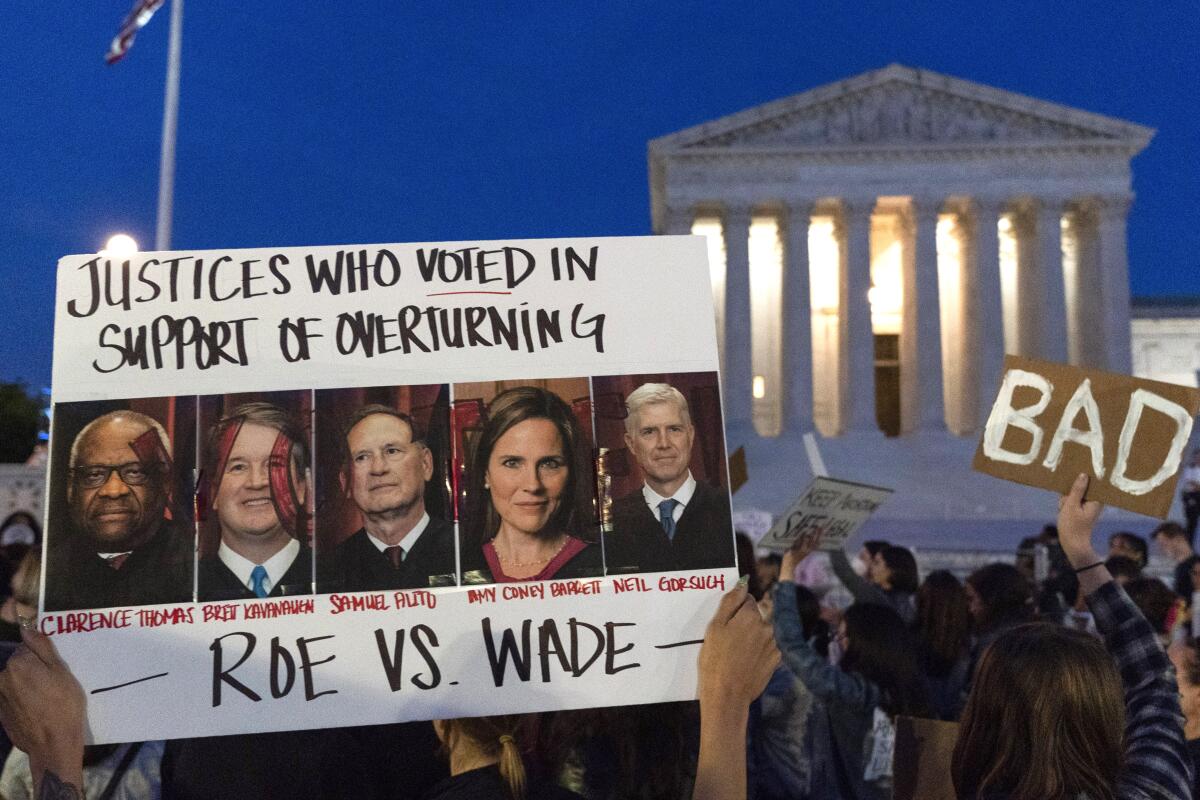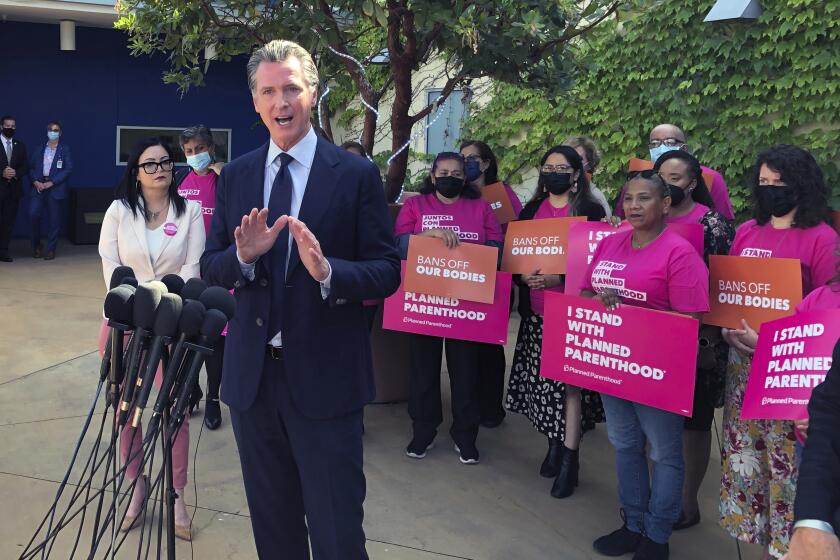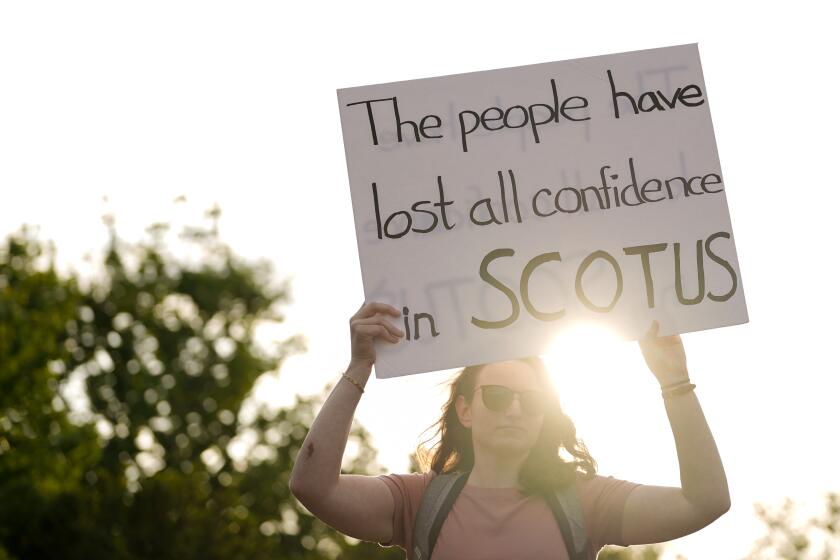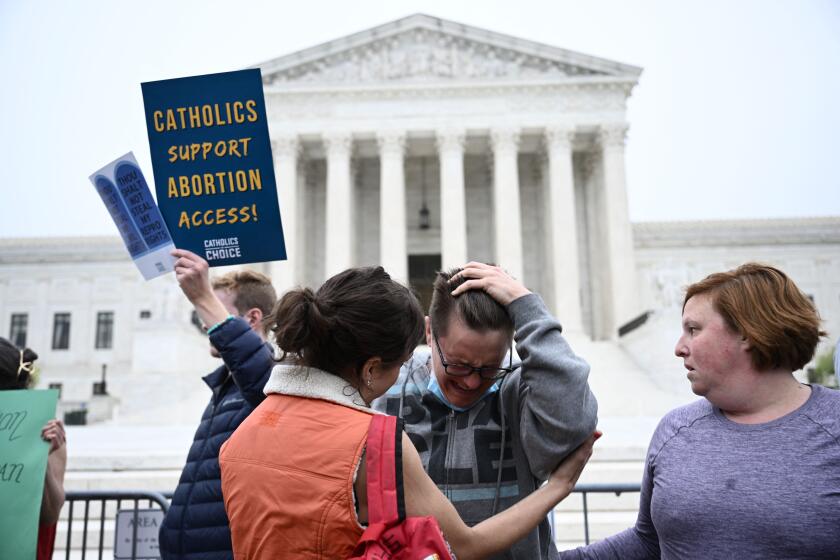Op-Ed: The Supreme Court flunks abortion history

- Share via
Monday’s revelation of a leaked draft opinion overruling Roe vs. Wade was shocking on many levels. It portends the end of a constitutional right that millions of Americans have relied upon for nearly half a century. It threatens dramatic political repercussions for the Supreme Court and elected officials. And it represents a stunning breach of the court’s protocol.
But the most shocking aspect of the leaked opinion is something else entirely: the glaring historical mistakes that pervade its supposedly originalist analysis. Contrary to the draft’s conclusion, for as long as America has existed, so too have abortions — in most cases free of any form of criminal punishment.
At the heart of the opinion’s legal reasoning is a settled test. The 14th Amendment, the draft recognizes, protects unenumerated rights that are “deeply rooted in this Nation’s history and tradition.” Applying that test, the opinion concludes that “the right to abortion does not fall within this category” because when the 14th Amendment was adopted, “three quarters of the States made abortion a crime at all stages in pregnancy.” It is this supposed historical fact that allows the opinion to conclude that states should be given free rein to ban abortion today.
In light of possible Roe vs. Wade overturn, Gov. Newsom calls California a ‘beacon of hope’ to residents of other states.
The first problem is one the opinion openly admits: Our nation’s history actually does support a right to abortion for much of early pregnancy. The draft acknowledges that at the time of the founding, people made a “distinction between pre- and post-quickening abortions,” and abortions were criminally punishable only if performed after quickening — the first notable movement of the fetus, which often occurs around 15-16 weeks in pregnancy.
Recognizing this hitch in its reasoning, the opinion pivots to a new assertion. The founding-era quickening rule is “of little importance” because by the time the 14th Amendment was ratified, “28 out of 37” states had enacted statutes “making abortion a crime even if it was performed before quickening.”
Except that the 28 states claim is wrong — a fact made plain even in the opinion’s appendix, which lists the abortion laws in force as of the 14th Amendment’s adoption. For example, the draft includes Nebraska and Louisiana as states that banned all abortions at any point in pregnancy. Yet both states actually banned only certain dangerous kinds of abortions — namely the use of “any poison or other noxious” substance (Nebraska) or “any drug or potion” (Louisiana). Neither state prohibited the common practice of abortion via surgical instrument. The 28 count also includes Florida, conveniently overlooking the fact that the state did not ban abortion until after the 14th Amendment was ratified.
Even more glaring is the draft opinion’s failure to understand state laws in the 19th century as they would have been understood at the time by lawmakers, judges and the broader public. To illustrate, the draft counts Oregon as a state that banned pre-quickening abortion by pointing to an 1864 law that punished any person who performs an abortion on “any woman pregnant with child.”
The conservatives have embarked on a crusade of judicial activism against a raft of precedents, and not just on abortion.
The opinion assumes that this language applied to pre-quickening procedures, but the truth is different: Oregon’s law simply echoed the longstanding common law rule, uniformly held by every state at the founding, that abortions are only illegal if performed after quickening. The authority for this conclusion is airtight: In 1909, Oregon prosecutors openly admitted in the Oregon Supreme Court that under the 1854 law, “abortion is not a crime” unless it results in the death of “a quick fetus.”
The leaked opinion makes the same mistake for Alabama, counting that state as banning pre-quickening procedures under an 1841 statute that codified the common law ban against performing an abortion on “any pregnant woman.” Alabama’s Supreme Court made clear in 1857, though, that “any pregnant woman” meant what it had always meant in common law: a woman who was “quick with child.” A pre-quickening abortion was thus “not punishable by law” in Alabama.
Similar problems plague the opinion’s inclusion of other state laws. The best evidence is that only 16 of 37 states banned pre-quickening abortions when the 14th Amendment was ratified. In the other 21 states, abortion remained perfectly lawful through roughly 16 weeks of pregnancy. As one pastor explained in response to a married woman who consulted him about a pre-quickening abortion, such an act was “no crime, because the child was not alive.”
All of this undermines the leaked opinion. Prominent originalists, including Michael McConnell, at Stanford, and Randy Barnett and Evan Bernick, at Georgetown and Northern Illinois University, respectively, have presented significant evidence that the 14th Amendment’s original meaning protects all rights that a substantial majority of states have respected over a lengthy period of our nation’s history. The right to pre-quickening abortion fits comfortably within that definition; it was respected by every single state at the founding, and by a supermajority when the 14th Amendment was ratified. Recognizing such a pre-quickening abortion right would be quite significant: Data show that 96% of abortions in America today occur before the 16-week mark.
Reversing landmark Roe ruling could turn abortion rights from abstraction into major issue
What is more, the right to pre-quickening abortion persisted in early America despite an organized, misogynistic campaign to ban it. The states that prohibited pre-quickening procedures did so in substantial reliance on appalling arguments about women’s inability to make their own reproductive choices, such as Horatio Storer’s infamous assertion that pregnant women are so “prone to . . . derangement” that they should not be “allowed to judge for [themselves] in this matter.” Bigoted and factually inaccurate views like these are no more binding on our constitutional understandings than historic laws grounded in white supremacy.
The leaked opinion’s ignorance of the true history of abortion — or worse, its duplicity — suggests that the justices in the conservative majority are not, as they claim in the draft opinion, merely “do[ing] our job, which is to interpret the law.” Instead, as Justice Sonia Sotomayor suggested at oral argument, the opinion’s flawed reasoning creates a “stench” that the court’s reading of the Constitution on abortion is just a “political act.”
To that charge we can now add another: It is an ahistorical one, too.
Aaron Tang is a professor of law at UC Davis and a former law clerk to Justice Sonia Sotomayor. @AaronTangLaw
More to Read
A cure for the common opinion
Get thought-provoking perspectives with our weekly newsletter.
You may occasionally receive promotional content from the Los Angeles Times.













